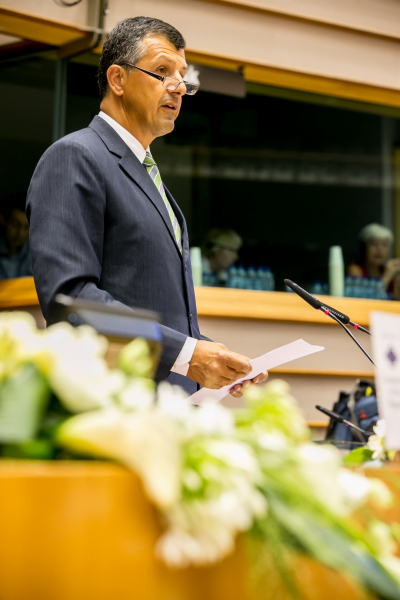
ECR Group Vice-President Oldřich Vlasák (Councillor of the City of Hradec Králové in the Czech Republic) warmly welcomed European Commission Vice-President Maroš Šefčovič's work on the Energy Union, but called for a greater focus on energy innovation, supporting the development of new technologies and improving the existing infrastructure. Mr Šefčovič took part in the 113th plenary session of the Committee of the Regions on 8 July.
Speaking on behalf of the ECR Group, Mr Vlasák explained that all too often, energy is approached from an assumption that we need to de-carbonise our economies by moving away from traditional sources and imposing binding targets that undermine the principles of subsidiarity and proportionality. "We would like to see more emphasis on backing technologies that reduce the negative environmental impact of traditional sources like coal", continued the ECR Group Vice-President, citing the examples of carbon capture and geological storage (CCS) and the need to improve the efficiency of coal-fuelled power stations.
Mr Vlasák gave three reasons why innovation and modernisation are crucial in the energy field.
He underlined that many of our economies remain dependent on traditional sources. This is the case especially for Germany, which uses more coal to generate electricity than any other Member State; Poland, where 90% of electricity comes from coal; and the United Kingdom, which comes third in the EU in terms of coal consumption. "If the EU continues to focus on moving away from the traditional sources through binding targets, then it will box Member States into committing limited resources to the detriment of another equally important areas", noted Mr Vlasák.
Secondly, Mr Vlasák highlighted that "the EU energy market remains far too dependent on a few suppliers with whom we have – to put it diplomatically – seriously complicated relations". According to the European Commission, the EU imports approximately 53% of the energy it consumes, including a third of its oil, 39% of its gas and 26% of solid fuels from the Russian Federation. Developments following the Arab Spring have shown that we cannot rely on energy imports from this direction either. Similarly, while there are various pipeline projects to bring Caspian energy to Europe, they are not likely to be operational before 2020 and will not diminish our markets' vulnerability to dynamics in the transit and exporting countries.
Third, Mr Vlasák pointed out that demand is increasing annually. The Paris-based International Energy Agency sees Europe's oil imports reaching 78% by 2035.
In light of all this, the ECR Vice-President called on the European Commissioner to boost the Commission's focus on research and development and to work with local and regional authorities to help develop regional centres of excellence where regional research can be supported and prioritised. Furthermore, Mr Vlasák urged the Commission not to forget about nuclear energy, from which as much as 27% of electricity in the EU is generated. This includes 77% of all electricity produced in France, 57% in Slovakia, 54% in Hungary, and 47% in Belgium. Other important fields that the Commission should not neglect are combatting electricity transmission and distribution losses, reducing energy consumption, and promoting efficiency in heating and cooling.
Furthermore, the ECR Group Vice-President endorsed the European Commission's work in the field of "smart cities", such as the European Innovation Partnership on Smart Cities and Communities. The initiative brings together European cities, industry leaders and representatives of civil society to smarten the EU's urban areas by developing solutions in the fields of energy, ICT and transport. On 20 July, the ECR Group Bureau is due to hold a seminar dedicated to the topic of smart cities in Kruszwica (Poland).

